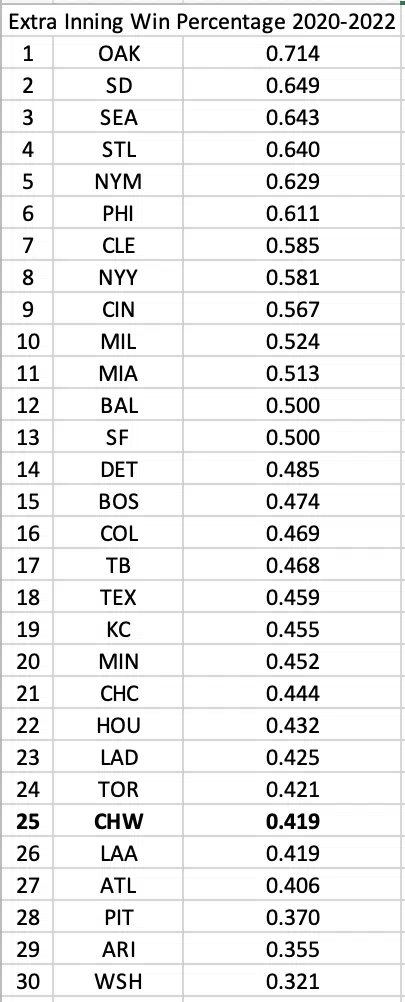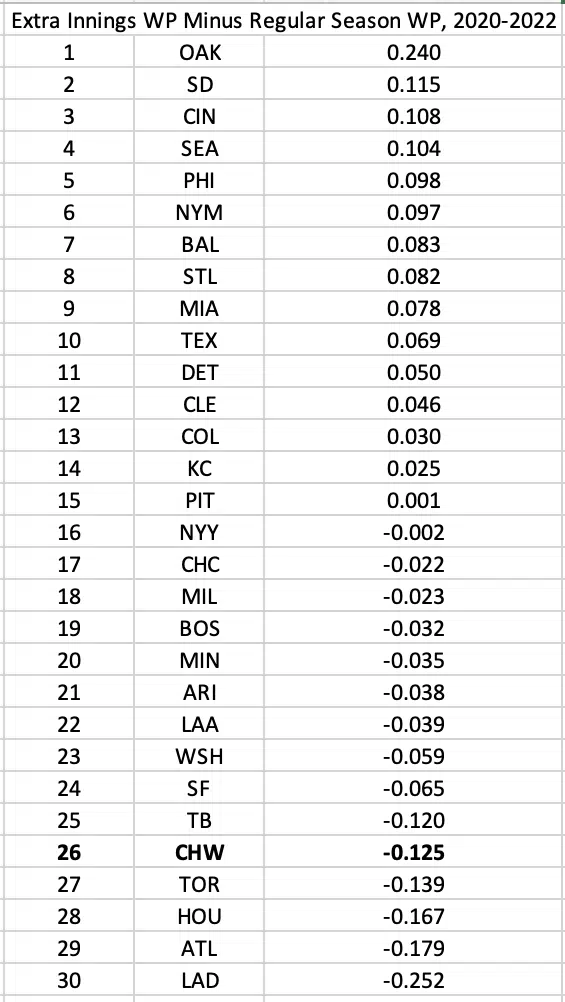Major League Baseball announced last week that the runner on second base to start extra innings will now be a permanent fixture of the regular season. The rule was introduced in the pandemic-shortened 2020 season, and whether you love the rule or hate it, it’s now here to stay.
Is this good news for the White Sox?
Since the rule’s implementation in 2020, two full seasons and one shortened season of data exist to see how the White Sox compare to the league. Three seasons of data lend 525 extra-inning games to examine. However, only 9.1% of all games played went to extra innings over this span.
White Sox in extra innings
Here’s how the White Sox have fared in extra-inning games over the past three seasons:
2020: 1-2
2021: 6-7
2022: 6-9
Overall: 13-18

As these records show, the White Sox have not excelled in extra innings during the era of the extra runner. In their 31 total games, they amassed only a .419 winning percentage. This puts the White Sox at 25th in the MLB for extra innings win percentage over this span.
It is important to examine what else this chart notes. The Astros, Dodgers, and Braves all find themselves on the bottom third of this list. Yet, they won the past three World Series. Therefore, poor extra innings records do not beget doom and gloom for clubs. However, these games are still missed opportunities for the White Sox, who have also not won nine-inning games at the clip those three teams have over the last three seasons.
White Sox in extra innings compared to 9-inning games
Additionally, I measured how well each team performed in extra innings compared to their regular season win percentage since the implementation of the rule. The metric is simple: extra-inning win percentage minus overall win percentage. A negative number means that a team performed worse in extras than they did overall, while a positive number means they performed better in extras than overall.

As you may have expected, the White Sox do not measure very well on this list either, ranking 26th. To qualify this, you once again see the Astros, Braves, and Dodgers at the bottom of this list.
Extra innings are more volatile and contain more variance, so it is very difficult to win them at the same pace as a very successful regular season. However, the White Sox have not maintained stellar records the last three seasons like the Astros, Braves, and Dodgers, so it is still frustrating to see the White Sox this low. Ideally for the White Sox, this number would at least be zero, meaning that a team performs at the .544 win percentage clip in extras that they posted over the totality of the last three seasons.
What can the White Sox do moving forward?
What do the White Sox need to do, then, to change this trend in 2023 and beyond?
Well, it starts with better management. The lowest bar is knowing the situation, and not making head-scratching mistakes, such as a reliever running the bases.
The next rung is more complex: give yourself the best chance in the ninth inning. If the game is tied heading into the ninth, the White Sox should approach the situation more consistently, and do what gives them the best chance to win.
Concretely, this means if the White Sox are the home team in a game tied going to the ninth, they should be throwing their highest-leverage pitcher in the top of the ninth. This gives them the best shot at blanking the opposition and winning the game on a walk-off, avoiding extra innings altogether. This does not directly improve their extra-inning record directly; however, it does give them a better chance to win games overall.
Alternatively, if the White Sox are away and fail to score in the top half of the ninth, they should still turn to their highest-leverage option for the bottom half of the inning. There is little point in saving this option for a bottom of the tenth that may never occur. This provides the White Sox with a chance to force more games into extra innings, rather than losing them without having an opportunity.
The team needs to also cut down on defensive miscues, as those can prove even more critical in extras with a man already on base. In extras, an error likely means a run will score, as well as add to the threat for more. Improving the defense improves the team as a whole, but is even more important in games with such fine margins.
New Third Base Coach Eddie Rodriguez needs to perform well. With a man already on second, more plays can occur at the plate. If he makes smart decisions, he can earn the White Sox a crucial run or two in extras throughout the season.
The final way to improve sounds simple: better execution. We don’t know exactly how new manager Pedro Grifol will approach extra innings. How aggressive will he be? How much does he want to bunt the man on second over to third? These answers will be borne out through the 2023 season. Regardless, though, the White Sox need to execute his vision.
If that means bunting, get a bunt down. If that means stealing or a hit and run, get a good jump (it should be easier than ever this year with the new rule changes). We can argue about the effectiveness of the different extra innings strategies, but the players need to execute whichever one Grifol calls for at the moment.
Executing the details can often decide the chaos and uncertainty of extra innings, and the White Sox must improve on the finer points of the game to avoid the failures that haunted them in 2022.
Follow us @SoxOn35th for more!
Featured Image – Syndication: The Enquirer
